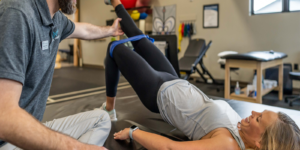There is so much advice about health and movement, and it is easy to get overwhelmed by the amount of information out there. This Blog is meant to be a resource for you by answering frequently asked questions you may have about movement, restrictions or pain you experience, prevention and wellness, etc. so that you can have a reliable source of information in an easily obtainable format. It is our hope that this Blog can help you shift your perspective and get you on a path to future wellness now. Let’s get started!
Q1: “ I hate exercising at the gym so every time I try to start a “workout routine” I fail. How do I find a way to get healthier without going to the gym?”
Exercise is not necessary to be healthy, activity is. Find something you enjoy doing and do it often. This may be walking your dog, hiking with your kids, skiing or riding your bike. Let your sense of fun be your motivation, rather than the obligation to work out. Remove the word “exercise” from your vocabulary and start thinking about “activities.” If it’s not fun, don’t do it!
Q2: As I get older I feel stiffer every morning; what can I do to prevent that?
Like many of our body structures and systems, our joints degenerate with time. This process is inevitable but we can certainly slow it down! The key is promoting mobility in all our joints by performing regular stretching before and after activity. For many of us the concept of stretching before we move or play a sport is normal, but few people think to stretch after a casual hike, walking the dog, or riding a bike. It may seem unnecessary after basic activities, but regular static stretching, muscle strengthening, and joint mobility will help you feel much better when you wake up each morning.

Q3: My grandfather passed away in his early 80s but seemed quite healthy before he stopped walking his dog daily. Is there any truth to the concept that you die when you stop moving?
Very much so. In fact, research has shown that inactivity is the fourth leading cause of death worldwide! When we stop moving our heart and other vital organs do not get the necessary input they need to function well. Inactivity is also a large contributor to diseases such as diabetes, heart disease, stroke, and obesity. It has been said that you stop moving when you get older, but – in reality – you get older when you stop moving!




